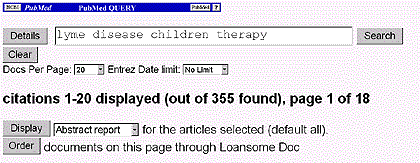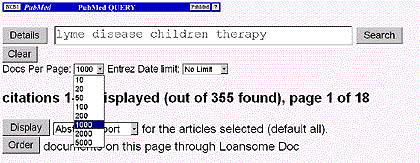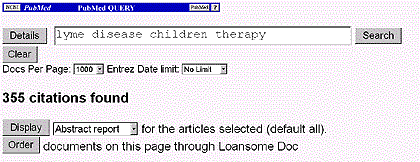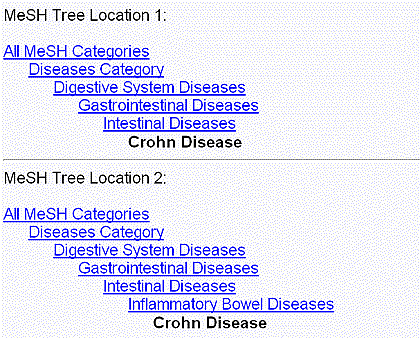Technical Notes - e1
Now Available LocatorPlus Tutorial! - e2
New MeSH Browser Available on the Web - e3
NLM Discontinues Direct Access to ELHILL and TOXNET Command/Menu Systems on September 30, 1999 - e4
Citing Articles in Journals Published in Print and on the Web - e5
![]() Hands On - e6
Hands On - e6
Hands On
Question:
I am trying to select citations to Order documents from my PubMed search results. Each time I click on the "Go to" button to view the next batch of citations I lose my previous selections. Is there a way around this?
Answer:
Yes, you can use the Docs Per Page pull-down menu to increase the number of citations displayed per page so that PubMed lists your entire search results on a single page. In PubMed, the default is to display your citations in batches of 20 (twenty) at a time as shown in
Figure 1. So, if you retrieve more than 20 citations PubMed will display your retrieval on multiple screens.
The Docs Per Page pull-down menu lets you increase the number of citations displayed on a single page up to as many as 5,000, as shown in Figure 2.
Figure 1 - Docs Per Page Set to Default Value 20

The summary line in Figure 1 shows that only the first 20 citations (out of 355 found) are displayed on the current page. You can order citations, print, or save from only one page at a time. Before you consider ordering, printing, or saving, it is advisable to increase the number of citations displayed per page, so that one page displays your entire retrieval. To have all of the citations displayed on a single page, select a number higher than the total number of your search results. For example, to display 355 citations on one page select 1000 from the menu as shown in Figure 2. Next, click on the Search button again and PubMed will redisplay your citations according to your page length selection, as shown in Figure 3.
Figure 2 - Docs Per Page Pull Down Menu with Value 1000 Selected

When all citations are displayed on one page, the summary line states only the total number of citations found, as shown in Figure 3. From this point, you can easily browse through the entire search results and click on the check boxes to mark citations for ordering, printing, or saving.
Figure 3 - Summary Line Shows all 355 Citations Found on One Page

[Editor's Note: The Internet Grateful Med (IGM) Web interface to MEDLINE interacts with PubMed and also displays 20 citations per page as a default. Unlike PubMed, the IGM page length cannot be modified, but IGM remembers your selections across pages.]
Question:
I ran a search using the strategy: Crohn disease [mh] NOT (colitis, ulcerative [mh] OR inflammatory bowel diseases [mh]), in PubMed, and got a "No Documents Found" message. Is there something wrong with the way I set up my search strategy?
Answer:
You have correctly used PubMed's search and syntax rules to construct the above search
strategy. For additional information on PubMed's search and syntax rules, please refer to
Additional Search Rules
(http://www.ncbi.nlm.nih.gov/entrez/query/static/help/pmhelp.html#MedicalSubjectHeadings)
under PubMed's online Help. However, your use of the MeSH field tag [mh] (which means that the MeSH heading will be automatically exploded) causes this search to yield zero results.
MeSH terms are arranged hierarchically by subject categories into "trees" with more specific terms arranged beneath broader terms. You can view the hierarchy of MeSH terms in the PubMed MeSH Browser (see PubMed's home page sidebar). As shown in Figure 4 below, a display of the MeSH term Crohn Disease in the PubMed MeSH Browser shows that it is located in two trees and in the second tree, it is indented under Inflammatory Bowel Diseases.
Figure 4 - PubMed MeSH Browser Display for Crohn Disease Tree Locations

In PubMed, MeSH terms are "exploded" automatically to retrieve citations that carry the specified MeSH heading and also retrieve citations that carry any of the more specific MeSH headings indented beneath it in the Tree structure. So, the search term, Inflammatory Bowel Diseases [mh] in the original search strategy was exploded and includes Crohn Disease. In addition, because the MeSH field tag is used, the search for the term is limited to only the MeSH Field. An unqualified search of a MeSH term (e.g., inflammatory bowel diseases without the [mh] tag) would search for Text Words as well as the exploded MeSH term.
Thus, the search term, crohn disease [mh] was accidentally included on both sides of the NOT expression by the explosion of the MeSH term, Inflammatory Bowel Diseases and that's what caused the zero retrieval. The search as typed in is shown below:
crohn disease [mh] NOT (colitis, ulcerative [mh] OR inflammatory bowel diseases [mh])
The search as it actually ran, with all the terms from the explosion included, is as follows:
crohn disease [mh] NOT (colitis, ulcerative [mh] OR megacolon, toxic [mh] OR inflammatory bowel diseases [mh] OR colitis, ulcerative [mh] OR crohn disease [mh])
Please note that Colitis, Ulcerative explodes to include the term Megacolon, Toxic and Inflammatory
Bowel Diseases explodes to include both Colitis, Ulcerative and Crohn Disease. Again, the appearance of Crohn Disease on both sides of the Boolean NOT is why there was no retrieval.
To turn off the automatic "explosion" which includes the more specific terms, use the qualifier
[field:noexp], e.g., inflammatory bowel diseases [mh:noexp].
If you want to retrieve all citations indexed to Crohn Disease that do not also have either
Inflammatory Bowel Diseases or Colitis, Ulcerative as index terms then use this syntax:
crohn disease [mh] NOT (inflammatory bowel diseases [mh:noexp] or colitis, ulcerative
[mh:noexp]).
In PubMed, MeSH terms are always automatically "exploded" to include the more specific terms
underneath, unless you override this feature using the [mh:noexp] qualifier. The PubMed MeSH
Browser is a quick way to view the hierarchical placement of a MeSH term within the tree structure
(i.e., to check what other terms will be included in your search strategy if the MeSH term is
explodable).
Also, bear in mind the following when constructing a search strategy that uses the MeSH field tags,
[mh] or [majr]:
Whenever terms are qualified using a MeSH field tag (e.g., crohn disease [mh]), the retrieval will be limited only to MEDLINE citations. PREMEDLINE and Publisher-supplied citations have not yet been indexed with MeSH terms and therefore are automatically excluded from the retrieval.
Subheading Pre-Explosions
Subheadings, used with MeSH terms to define a particular aspect of a subject, are also arranged
hierarchically and automatically exploded. For the list of subheading "trees" refer to the
Search Field Description and Tags
section under PubMed's online Help and click on More Specific Subheading Terms in the Subheadings section or go directly to:
http://www.ncbi.nlm.nih.gov/entrez/query/static/help/pmhelp.html#SearchFieldDescriptionsandTags
If you type in colitis, ulcerative/diagnosis [mh] in PubMed, both the MeSH heading and the
subheading will be exploded and the actual terms included in the search strategy will be as follows
(even though they are not displayed in the Details box):
colitis, ulcerative/diagnosis OR colitis, ulcerative/pathology OR colitis, ulcerative/radiography OR
colitis, ulcerative/radionuclide imaging OR colitis, ulcerative/ultrasonography OR megacolon,
toxic/diagnosis OR megacolon, toxic/pathology OR megacolon, toxic/radiography OR megacolon,
toxic/radionuclide imaging OR megacolon, toxic/ultrasonography
To limit your search to only the specific MeSH heading/subheading combination, use the format:
colitis, ulcerative/diagnosis [mh:noexp]
The [mh:noexp] turns off all the explosions for both the subheading and the MeSH heading. If you wish to turn off the explosion for only the subheading then you must free-float the subheading, e.g.,
colitis, ulcerative AND diagnosis [sh:noexp]
This will retrieve both terms Colitis, Ulcerative and Megacolon, Toxic and the subheading diagnosis
will appear somewhere in the indexed terms, but not necessarily attached to either of these MeSH
headings.
